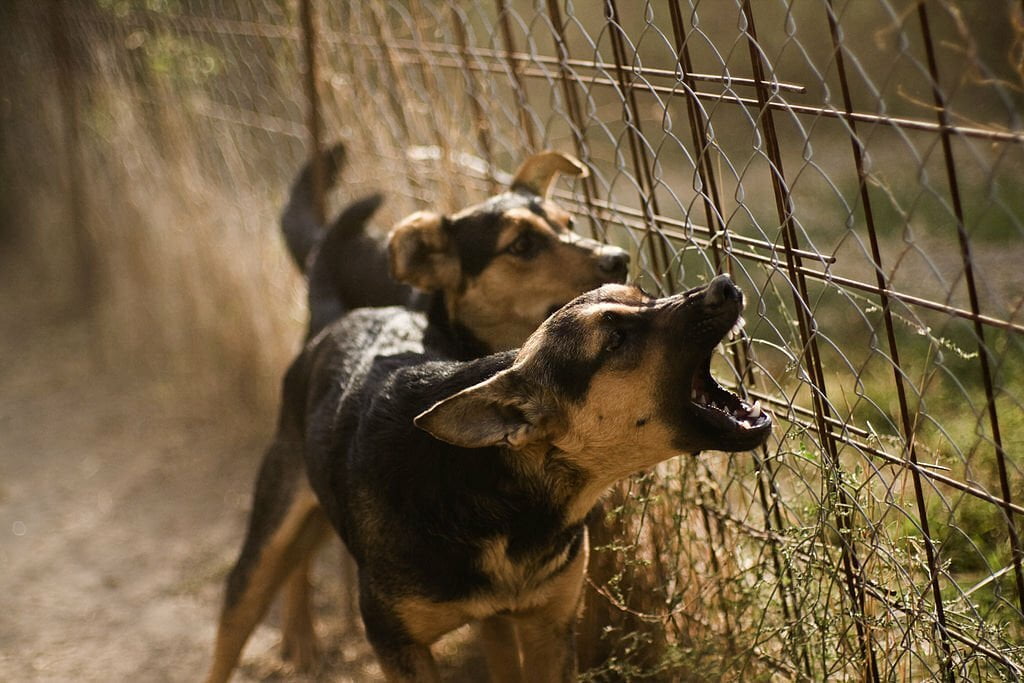The 8 Most Aggressive Dog Breeds, These most aggressive dog breeds have a unique charm that goes beyond their massive stature.
1. Great Dane: The Gentle Giant
Despite their massive stature, Great Danes are renowned for being excellent family dogs. Their affectionate demeanor and natural loyalty make them wonderful companions, especially in households with children. Contrary to their imposing appearance, Great Danes are often described as “gentle giants” due to their calm disposition and friendly attitude toward people.
In addition to their amiable personalities, Great Danes are known for their adaptability. Despite their size, they can adapt well to apartment living as long as they receive sufficient exercise. Regular walks and playtime are crucial to maintaining their overall well-being. The Great Dane’s regal appearance and loving nature contribute to its popularity as a beloved giant breed.
2. Saint Bernard: Heroes of the Alps
Saint Bernards are large, strong dogs with a distinctive coat that can be smooth or rough. Their expressive eyes and friendly expressions add to their overall charm. Despite their massive size, they are known for being excellent with children and are considered reliable family dogs. Their patient and gentle disposition makes them suitable for households of all sizes.
While the image of the Saint Bernard carrying a small barrel of brandy may be a romanticized notion, it underscores their historical role as rescuers in the snowy Alps. These dogs are not only loyal and protective but also sociable and friendly, making them a wonderful addition to families seeking a big-hearted companion.
3. Newfoundland: Water-Rescue Prowess
Newfoundlands are large dogs with a thick, water-resistant double coat that can be black, brown, gray, or Landseer (white with black markings). Despite their size, they are known for their sweet and gentle nature, especially towards children. Newfoundlands are often described as “nanny dogs” for their protective instincts and patience with youngsters.
Beyond their historical role as working dogs, Newfoundlands make excellent family pets. Their calm demeanor and willingness to please make them easy to train, and their loyalty ensures a strong bond with their human family. Regular exercise and access to water are essential for these gentle giants, ensuring their overall health and happiness.
4. Irish Wolfhound: Tall, Dark, and Gentle
Irish Wolfhounds are characterized by their rough, wiry coat and distinctive appearance. Despite their impressive height, they are known for their friendly and laid-back nature. These dogs are gentle giants with a calm demeanor, making them suitable for families and individuals alike.
In addition to their gentle nature, Irish Wolfhounds are known for their loyalty. They form strong bonds with their families and are often described as “gentle giants” due to their friendly interactions with children and other pets. While their size may be imposing, their hearts are equally large, filled with affection for their human companions.
5. Bernese Mountain Dog: Tri-Color Elegance
Bernese Mountain Dogs are characterized by their thick, long, and wavy coat, which typically features black, rust, and white coloring. Despite their imposing size, they are known for their friendly and gentle temperament. Berners, as they are affectionately called, are excellent family dogs, displaying patience and affection towards children and other pets.
Beyond their appearance, Bernese Mountain Dogs are valued for their loyalty. They form strong bonds with their human family and thrive on companionship. Their calm and affectionate nature, coupled with their intelligence, makes them relatively easy to train. Regular exercise and mental stimulation contribute to the overall well-being of these majestic dogs.
In part two, we will explore three more captivating big dog breeds, each with its own unique characteristics and contributions to the world of canine companionship.
6. Doberman Pinscher: Loyalty and Protective Instincts
The Doberman Pinscher, known for its sleek and muscular build, often earns a reputation for being a loyal and protective breed. While Dobermans are naturally inclined to be watchful and responsive to their surroundings, aggression in this breed is typically a result of improper training or a lack of socialization. With proper guidance and responsible ownership, Dobermans can showcase their true nature as devoted family members with a strong sense of loyalty and protection.
7. Chow Chow: Reserved Dignity with Territorial Traits
8. Akita: Noble Guardians with a Strong Presence
Akitas, characterized by their noble appearance and imposing stature, are inherently protective and loyal. Akitas tend to be reserved with strangers, and their strong guarding instincts can be misconstrued as aggression. Responsible ownership involves early socialization and consistent training to harness their protective nature positively. Akitas, when well-raised, embody a dignified and devoted companion.
Nurturing Positive Behaviors: A Collective Responsibility
Understanding and addressing aggression in dogs, regardless of breed, requires a collective commitment to responsible ownership. Proper socialization, positive reinforcement training. And meeting the specific needs of each breed contribute to a harmonious relationship between dogs and their owners. By fostering a culture of education and dispelling stereotypes. We empower ourselves to nurture the best qualities in our canine companions while minimizing undesired behaviors.

